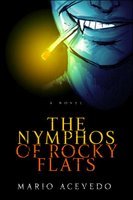STATUS: Pleeeaassse… The beach is a calling. Working? What’s that? Yep, I’m in Daytona. I actually to plan to go to the registration desk and check in for the conference. Then a little breakfast and then right to the beach. Oh yeah!
What song is playing on the iPod right now? Listening to the crash of waves. Oceanfront view!
Definition 3: One that got away can mean a manuscript for which I read the full but then decided to pass.
I remember reading an article (and this was at least a year or two ago) and in it was a story from literary agent Stuart Krichevsky (and since my memory is faulty it might not have been Stuart but I’m pretty sure it was). In it, he divulged a very amusing tidbit about passing on a project called MUTANT MESSAGE FROM DOWN UNDER, which later when on to sell a million copies.
DOH!
He just laughed at himself in the article. That work just didn’t grab him when he gave it a look. Now he kind of half-heartedly kicks himself. Not really because he’s got Sebastian Junger on his roster (and a bunch of other great names). So what? He missed one great project. After agents are in the business for 25 years or more, we probably have a bunch of big sellers on our list (at least I do in my dreams of when I’ve been in the business for that long—big smile here). I’ve had my own agency now for only 4 years and I’m not unhappy as to where it is. My clients are building and their name recognition growing. In 25 years, they’ll all be big sellers (hear that clients? Get busy!)
Yeah, I imagine that if I had been an agent 10 years ago and was in the UK and passed on a little project called Harry Potter, I’d probably want to kick myself. Good thing it wasn’t even a possibility for me because that would feel pretty yucky.
Luckily, I think that was a phenomenon and unlikely to occur again in my lifetime.
Most “overnight” successes take about 10 years (Dan Brown a prime example).
But there is one project that I read a full manuscript for and do sort of feel some regret for passing on it. The book hasn’t actually published yet so I have no idea if it will be a big seller or not.
That in itself wouldn’t necessarily trigger regret.
No, I regret passing on this book because I really, really liked it but thought it needed some editorial input before submitting. At the time, days in the office were crazy with the negotiation of the Disney deal and a bunch of other projects. I felt overwhelmed and thought, gee, I haven’t got the time to really do this justice right now.
I even called the author and chatted with her. But, I passed. In the months that followed, I kept thinking about that novel and would give myself a little kick. I should have taken it on because the story kept coming back to me.
Then I saw the deal post in deal lunch. Here it is:
Terri Garey’s DEAD GIRLS ARE EASY, about a former Goth girl who wakes up from a near-death experience to find herself an unwilling ‘ghoulfriend’ to the dead – described as Mary Janice Davidson meets The Sixth Sense, to Erika Tsang at Avon, in a pre-empt, in a two-book deal, by Annelise Robey at Jane Rotrosen Agency (world English).
This one got away. For me.
For Terri, she’s probably thrilled that Annelise was one smart cookie and took it on. It should be coming out this fall or early next spring. Look for it!




